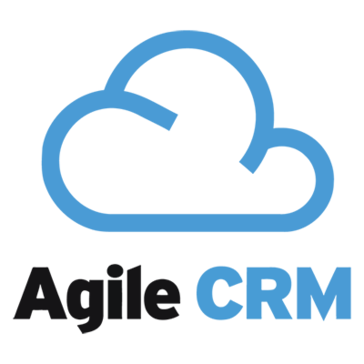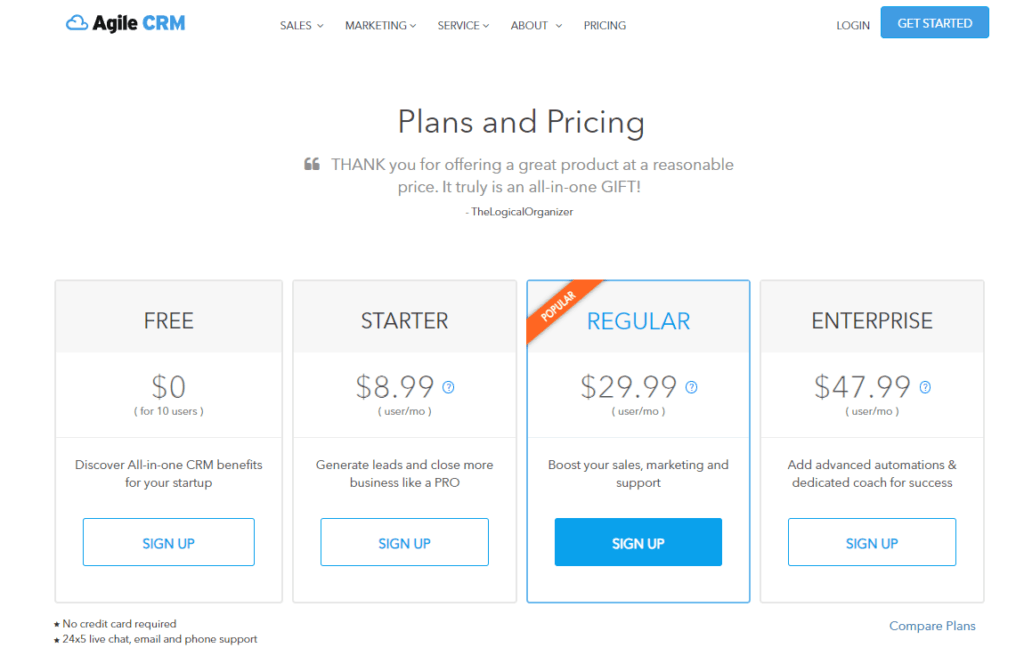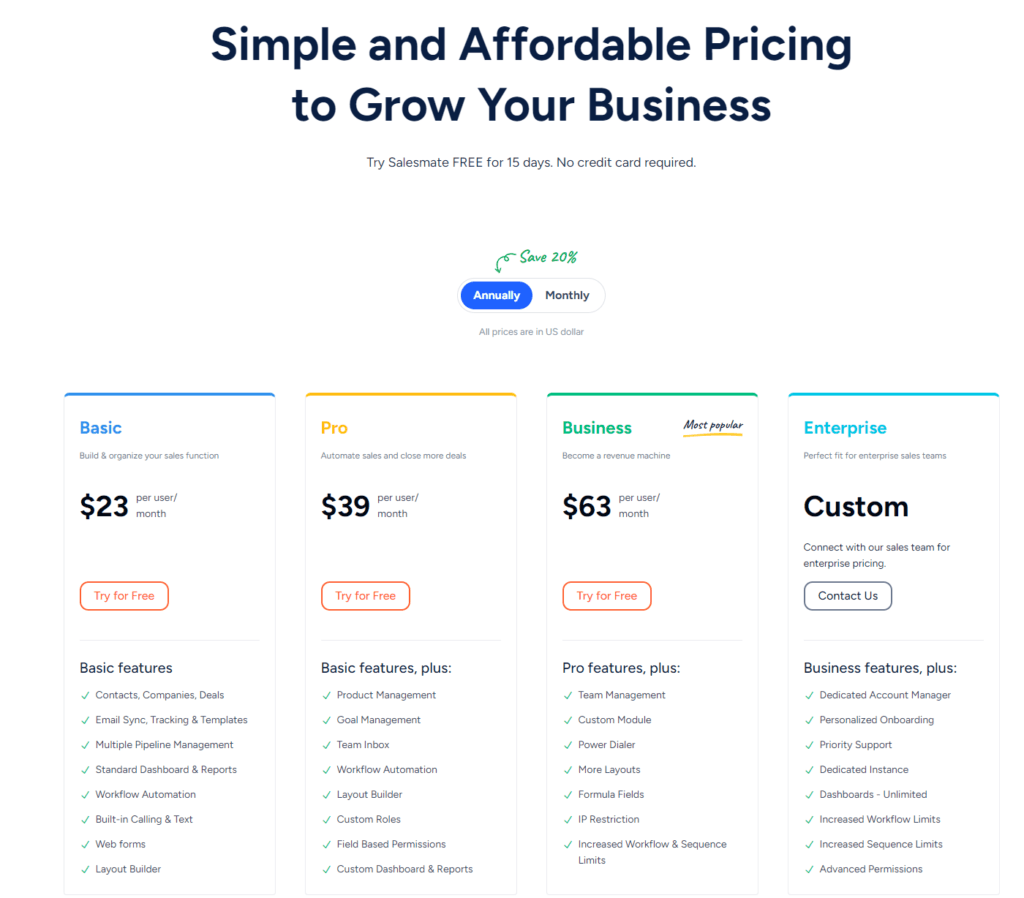In today’s digital era, the right Customer Relationship Management (CRM) tool can make all the difference in achieving business success. With the vast array of options available, making the right choice can feel like navigating through a labyrinth. Among the standout contenders, Agile CRM and Salesmate emerge as popular choices, each offering unique features to streamline sales processes, enhance customer relationships, and boost productivity. But which one is the best fit for your business needs? To aid in your decision-making process, we embark on a detailed comparison.
| Agile CRM | Salesmate |
|---|---|
 |  |
| G2 Score -4.0 out of 5 | G2 Score -4.6 out of 5 |
| TrustRadius Score -7.5 out of 10 | TrustRadius Score -9.8 out of 10 |
Ease of Use and User Experience
Agile CRM: Comprehensive Yet Intuitive
Agile CRM is celebrated for its all-in-one approach, combining sales, marketing, and service automation in a single, unified platform. Despite its extensive functionalities, Agile CRM maintains an intuitive user interface that simplifies navigation and task management. It’s designed to cater to the needs of small to medium-sized businesses, offering a straightforward setup and user-friendly dashboard that provides a comprehensive view of customer interactions, sales pipelines, and ongoing campaigns.
The platform’s emphasis on ease of use extends to its customization capabilities, allowing users to tailor the CRM to their specific workflows with minimal effort. Agile CRM also offers a variety of pre-built templates for web forms, email campaigns, and landing pages, further streamlining the user experience by reducing the time and technical know-how required to execute effective marketing strategies.
Salesmate: Streamlined for Efficiency
Salesmate, on the other hand, focuses on delivering a seamless UX with a strong emphasis on sales acceleration and efficiency. The platform stands out for its clean, modern interface that prioritizes simplicity without sacrificing depth in functionalities. Salesmate makes it easy for sales teams to manage contacts, deals, and activities, ensuring that valuable information is always just a few clicks away.
One of the key strengths of Salesmate is its adaptability to various sales processes, supported by customizable workflows, pipeline views, and automation rules. This adaptability, combined with the platform’s user-centric design, makes Salesmate an attractive option for businesses looking to minimize administrative tasks and focus on closing deals.
Integration Capabilities
Moving forward in our detailed comparison between Agile CRM and Salesmate, we now focus on a crucial aspect for any modern business seeking to maximize efficiency and streamline operations: Integration Capabilities. The ability of a CRM to seamlessly integrate with other tools and platforms is vital, as it can significantly enhance functionality, reduce manual work, and ensure a cohesive flow of information across different business applications. Let’s explore how Agile CRM and Salesmate stack up in terms of their integration ecosystems.
Agile CRM: A Hub of Connectivity
Agile CRM prides itself on offering a robust integration framework designed to connect seamlessly with a wide array of third-party applications and services. This includes essential tools for email marketing, social media management, customer support, and e-commerce platforms, among others. Notable integrations include Google Workspace, Microsoft Office 365, Shopify, and Stripe, facilitating a unified approach to managing customer interactions, sales, and marketing efforts from a single platform.
The platform’s API also allows for custom integrations, providing businesses the flexibility to tailor Agile CRM’s capabilities to their specific needs and tech stacks. This comprehensive approach to integration supports Agile CRM’s all-in-one philosophy, ensuring businesses can leverage their existing tools alongside the CRM for enhanced efficiency and insights.
Salesmate: Streamlined Integration for Sales Acceleration
Salesmate emphasizes seamless integration with a focus on sales acceleration and productivity. The platform offers direct integrations with a variety of key business tools, including email service providers, communication apps, and financial software, ensuring that sales teams have access to the information and functionalities they need within the CRM. Key integrations include Google Workspace, Slack, and QuickBooks, among others, enabling businesses to streamline their sales processes and maintain a holistic view of customer relationships and financial data.
In addition to pre-built integrations, Salesmate’s API supports custom connections, allowing businesses to further customize their CRM experience to align with their operational workflows. Salesmate’s integration capabilities are designed to minimize friction in the sales process, ensuring teams can focus on engaging leads and closing deals without being hindered by disconnected systems.
Pricing and Scalability
Shifting our focus to an aspect that often serves as a critical deciding factor for many businesses, let’s explore Pricing and Scalability between Agile CRM and Salesmate. Understanding the pricing structure, what’s included at each price point, and how the CRM can scale with your business growth is essential. It ensures the investment not only fits your current budget but also aligns with your long-term business objectives. Let’s break down how Agile CRM and Salesmate compare in terms of their pricing strategies and scalability options.
Agile CRM: Flexible Pricing for Growing Businesses

Agile CRM offers a tiered pricing model designed to accommodate businesses at various stages of growth. Starting with a free version for small businesses or startups looking to get their feet wet with CRM functionalities, Agile CRM’s pricing tiers escalate in features and costs, catering to growing demands. The jump from the free version to paid plans introduces significant enhancements in automation, marketing tools, and customer support capabilities.
One of Agile CRM’s strengths is its balance between affordability and feature-rich offerings across its pricing tiers. The platform aims to be accessible for small businesses while providing the scalability and advanced functionalities larger enterprises require. The transition between tiers is straightforward, allowing businesses to upgrade as their needs evolve without significant disruptions to their operations.
Salesmate: Customizable Pricing for Diverse Needs

Salesmate also employs a tiered pricing structure, but with a focus on customizable scalability that can serve a wide range of business sizes and types. Unlike Agile CRM, Salesmate does not offer a free tier, but its entry-level pricing is designed to be competitive and accessible for small businesses. Each subsequent tier adds more advanced features, including higher levels of automation, more sophisticated sales intelligence tools, and increased customization options.
Salesmate’s pricing model is distinguished by its flexibility, allowing businesses to add or remove features based on their specific needs. This a la carte approach ensures that companies pay only for the functionalities they require, making Salesmate a cost-effective option for businesses that prioritize budget efficiency alongside CRM scalability.
Analytics and Reporting
Continuing our comparison of Agile CRM and Salesmate, we now turn our attention to Analytics and Reporting—key features that empower businesses to harness the power of data for strategic decision-making. The depth, flexibility, and accessibility of a CRM’s analytics tools can significantly influence its overall effectiveness, offering insights into sales performance, customer behaviors, and marketing campaign effectiveness.
Agile CRM: Comprehensive Insights for Informed Decisions
Agile CRM offers robust analytics and reporting features designed to provide businesses with comprehensive insights into their sales, marketing, and service activities. The platform enables users to generate a wide array of reports, from sales performance and pipeline analysis to marketing campaign ROI and customer support metrics. Agile CRM’s strength lies in its ability to offer detailed insights that help businesses understand customer interactions and identify opportunities for growth and optimization.
The platform also provides customizable dashboard capabilities, allowing users to tailor their view to focus on the metrics that matter most to their operations. This level of customization ensures that teams across the organization can access relevant data insights quickly, facilitating informed decision-making and strategic planning.
Salesmate: Streamlined Reporting for Sales Acceleration
Salesmate focuses on providing streamlined and actionable analytics that directly support sales acceleration and efficiency. The CRM’s reporting tools are designed to offer clear insights into sales activities, pipeline health, and individual and team performance. Salesmate’s analytics enable businesses to closely monitor their sales processes, identify bottlenecks, and understand what drives success in their sales efforts.
One of the key advantages of Salesmate’s analytics is the ease of use, with a user-friendly interface that simplifies data analysis for all users, regardless of their technical expertise. The platform also offers real-time reporting capabilities, ensuring that businesses have access to up-to-the-minute data to make timely decisions.

Related: Check out our free SEO suite

Customer Support and Training
As we delve into the Customer Support and Training aspects of Agile CRM and Salesmate, it’s clear that the level and quality of support provided can significantly impact user experience and overall satisfaction with the CRM platform. Effective customer support ensures users can resolve issues swiftly, while comprehensive training resources are crucial for maximizing the platform’s potential. Here’s a closer look at how Agile CRM and Salesmate approach customer support and education.
Agile CRM: Emphasizing Support and Educational Resources
Agile CRM offers a variety of support channels, including email, phone, and live chat, aiming to cater to different preferences and ensure users can easily access assistance. The platform provides 24/7 support to all users, with priority support available to higher-tier plan subscribers. This commitment to accessible support helps users address and resolve issues promptly, minimizing disruptions to their business operations.
In addition to direct support, Agile CRM invests in comprehensive training resources. The platform features a rich knowledge base, detailed documentation, tutorial videos, and webinars designed to help users understand and leverage the full range of CRM functionalities. These educational resources cover both basic and advanced topics, ensuring users at all levels can enhance their CRM skills and knowledge.
Salesmate: Prioritizing Rapid Response and User Empowerment
Salesmate emphasizes rapid response and efficiency in its customer support, offering live chat, email, and phone support. The platform is known for its responsive support team, with a strong focus on providing timely and helpful assistance to address users’ inquiries and issues. Salesmate’s support system is structured to ensure that all users, regardless of their subscription plan, receive high-quality assistance.
Beyond reactive support, Salesmate provides an extensive suite of self-help resources, including a comprehensive help center, instructional guides, and video tutorials. The platform also offers live webinars and training sessions to help users get the most out of their CRM. Salesmate’s approach to user education is geared towards empowering users with the knowledge and tools they need to successfully implement and utilize the CRM in their sales processes.
Conclusion
Concluding our in-depth exploration of Agile CRM and Salesmate, we’ve traversed crucial aspects that shape a CRM platform’s effectiveness and suitability for businesses. From ease of use and user experience, pricing and scalability, to integration capabilities, analytics and reporting, and finally, customer support and training, both Agile CRM and Salesmate have revealed their distinct strengths and features tailored to meet diverse business needs.
READ NEXT:
- Creating a Content Calendar: Organizing for Consistency and Impact
- Zoho CRM vs SugarCRM: The Best CRM Tool for You
- Insightly vs Bitrix24: The Best CRM Tool for You
- Wise Agent vs Salesmate: The Best CRM Tool for You
- Zoho CRM vs Insightly CRM: The Best CRM Tool for You
- 9 Best Marketing CRM Software (For You): In 2023
- 19+ Top Customer Relationship Management (CRM) Software: What’s Best?





















